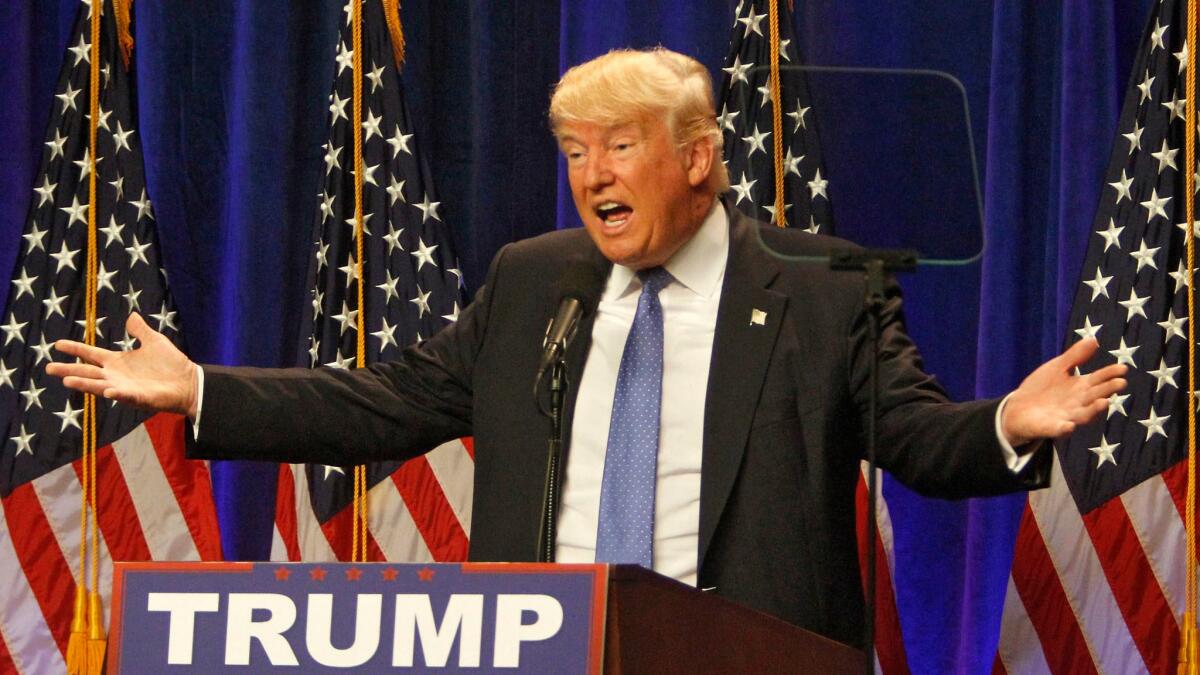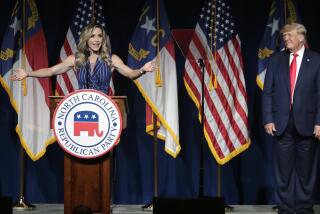Column: Is this a presidential campaign or a clash of civilizations?

- Share via
The general election campaign has barely started, and it’s already turned into a clash of civilizations. Not a clash between Islamic and Judeo-Christian civilization, although Donald Trump sometimes makes it sound that way. Instead, it’s a battle between two different views of American civilization. Are we teetering anxiously on the edge of destruction? Or are we still optimistic despite recurring terrorism and mass violence?
One candidate, Trump, speaks to the gut and unabashedly stokes voters’ fears.
“If we don’t get tough … we’re not going to have our country anymore,” the presumptive Republican nominee said in the aftermath of the shooting in Orlando, Fla. “There will be nothing – absolutely nothing – left.” Nothing?
He also accused American Muslims of willfully harboring terrorists.
“The Muslims have to work with us,” he said. “They knew that [the Orlando gunman] was bad. They knew that the people in San Bernardino were bad. But you know what? They didn’t turn them in. And you know what? We had death and destruction.”
Actually, law enforcement officials say many of their best tips about potential terrorists come from Muslim communities. And Omar Mateen, the Orlando shooter, was “turned in” to police at least twice.
The other candidate, Hillary Clinton, pleads for unity and proposes wonky policy plans – including such bloodless stuff as “an intelligence surge to bolster our capabilities across the board, with appropriate safeguards here at home.”
This week, she suggested that incremental improvements in law enforcement, plus a new commitment to civility, could overcome the terrorist threat.
“I have no doubt we can meet this challenge if we meet it together,” she said.
And she recalled that on Sept. 12, 2001, “We did not attack each other; we worked with each other to protect our country…. I am so confident and optimistic that is exactly what we will do.”
There’s not much evidence for that in the campaign, though.
It’s not just horrific violence that exposes the rift in how the candidates perceive the country’s position.
It was not the type of speech that one would expect from someone who wants to lead our country through difficult times.
— Sen. Bob Corker (R-Tenn.), referring to Donald Trump’s response to the Orlando terror attack
Trump says he wants to “make America great again” – an America that, in his view, is losing its identity and its security because of uncontrolled immigration from Mexico and the Middle East.
Clinton says she wants to make America great too, but the “again” is missing from her version. Clinton’s America is in fundamentally good shape except for a sputtering, unequal economy.
The dichotomy is mirrored among their voters. A Pew Research Center poll in March found that 75% of Trump supporters believed life in America had gotten worse (“for people like you”) in the last 50 years. Among Clinton supporters, only 22% thought life had gotten worse, and 53% thought life had improved. (Among voters overall, 46% thought life had gotten worse, 34% that it was better.)
This time, Trump may have gone too far. A chorus of Republican leaders said Tuesday that they were distressed at their nominee’s slash-and-burn rhetoric – and at his renewed insistence that immigration from Muslim countries be stopped.
“I do not think a Muslim ban is in our country’s interest,” House Speaker Paul D. Ryan (R-Wis.) said. I do not think it is reflective of our principles.”
“The vast, vast majority of Muslims in this country and around the world are moderate. They’re peaceful. They’re tolerant. And so they’re among our best allies.”
The chairman of the Senate Foreign Relations Committee, Bob Corker (R-Tenn.), said he was “disappointed” by Trump’s speech.
“After 49 people have perished, it was not the type of speech that one would expect from someone who wants to lead our country through difficult times,” he told me.
In recent weeks, Corker and other GOP leaders have urged Trump to sound more presidential.
“I must admit that I am personally discouraged,” said Corker, who has been mentioned as a potential vice presidential candidate.
But Trump may be acting more strategically than it looks, as is often the case. The GOP historically gets the benefit of the doubt from voters on national security issues, and so far that has benefited Trump as much as any Republican. A Gallup poll last month (before Orlando) found that 50% of voters think he’s better equipped than Clinton to deal with terrorism and national security. (Her number was 46%.)
If Trump can turn the election into a referendum on whether Americans feel safe against terrorists, he might win. On the other hand, if the election becomes a referendum on whether voters will feel safe with Trump as president, he’s more likely to lose.
It’s far too early to make predictions. All we know for sure from these initial skirmishes is that Trump doesn’t plan on “pivoting” to a more presidential persona – and that this is already the ugliest presidential campaign in modern memory.
Twitter: @DoyleMcManus
Follow the Opinion section on Twitter @latimesopinion or Facebook
More to Read
A cure for the common opinion
Get thought-provoking perspectives with our weekly newsletter.
You may occasionally receive promotional content from the Los Angeles Times.











